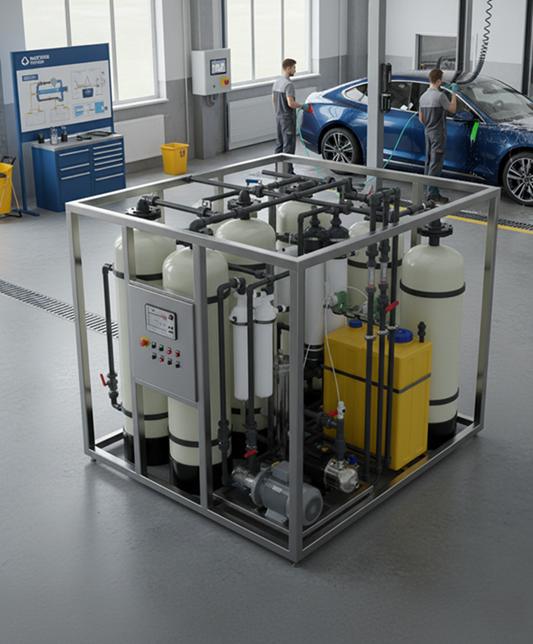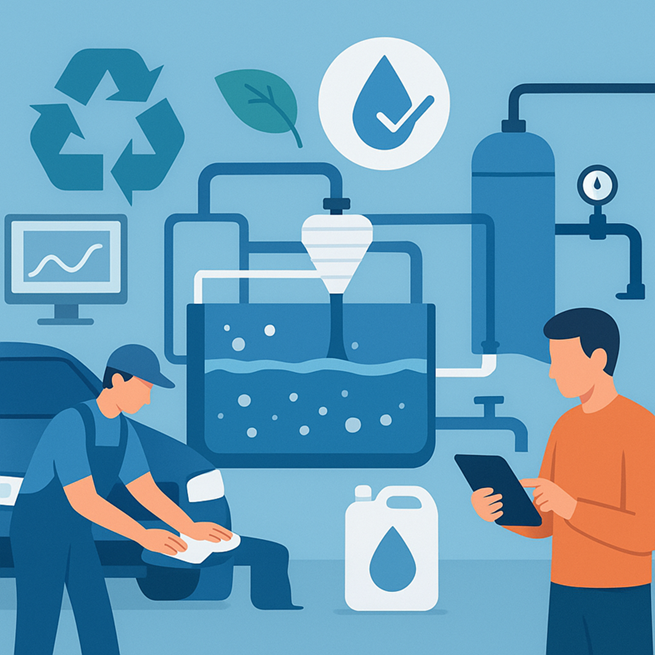
5 Water Management Challenges Facing Car Service Centers
Car service centers face a complex set of water management challenges, which have significant implications for environmental sustainability and operational efficiency. With increasing scrutiny of their environmental impact, these centers must adhere to strict water usage regulations and compliance requirements, particularly regarding wastewater management and treatment. Failure to comply with these regulations can result in severe penalties, including fines and reputational damage. This makes effective water management not only a legal obligation but also a financial necessity for companies operating in the automotive service sector.
One of the key challenges is the effective treatment and management of wastewater, which is often heavily contaminated with oils, grease, and various pollutants. The complex composition of this wastewater requires sophisticated treatment systems, resulting in increased operational costs and technical complexity.
In addition, implementing water recycling and reuse systems presents both opportunities and obstacles. The initial investment can be significant, and many service centers lack the space and infrastructure necessary to accommodate these environmentally friendly solutions.
Furthermore, the ongoing global water crisis exacerbates the need for sustainable practices in this sector. As water scarcity worsens due to climate change and population growth, automotive service centers are under pressure to adopt innovative water management strategies, such as rainwater harvesting and waterless cleaning techniques.
Challenge 1: Water Use Regulations
The automotive service industry faces significant challenges in complying with stringent water use regulations. Local, state, and national laws impose strict guidelines on water consumption and wastewater discharge, which are critical to protecting the environment and public health. These regulations are designed to mitigate the negative impacts of water mismanagement, such as water pollution, habitat destruction, and ecosystem degradation.
Regulatory Compliance and Financial Impacts
Failure to comply with these regulations can result in severe penalties, including fines, revocation of operating licenses, and damage to the company’s reputation. For auto repair shops, the initial costs of implementing compliant water recycling and treatment systems can be significant, complicating financial planning. Many companies express concern that these costs may not be immediately offset by operational savings. This poses a dilemma when investing in sustainable practices.
Environmental and Training Challenges
In addition to the financial burden, ensuring compliance requires a deep understanding of various regulations, such as the Clean Water Act and state-specific wastewater management laws. For example, in some locations, car wash operators must adhere to comprehensive wastewater disposal guidelines, adding another layer of complexity to compliance efforts.
Furthermore, companies often lack the training and resources necessary to operate water recycling systems effectively, increasing the risk of regulatory violations. This creates a situation that forces companies to invest not only in technology but also in employee training on responsible water resource management.
The Role of Local Authorities and Environmental Agencies
Local authorities play a pivotal role in enforcing water use regulations, with agencies such as the Environmental Protection Agency (EPA) and state agencies responsible for monitoring compliance.
Read more about: Regulatory Compliance and Innovative Technologies in Wastewater Management at Auto Service Centers
Challenge 2: Wastewater Management
Effective wastewater management is a major challenge facing auto service centers, particularly due to the unique and complex nature of automotive wastewater. Manufacturing processes used in automotive service, such as washing parts and painting vehicles, produce wastewater heavily contaminated with various pollutants, including oils, greases, lubricants, solvents, and heavy metals such as lead and chromium. This complexity requires sophisticated treatment systems capable of handling a wide variety of contaminants.
Complexity of Pollutants
Wastewater from auto service centers is characterized by its complex composition, making treatment a challenging process. Each stage of production contributes different pollutants, requiring multiple stages of chemical, physical, and biological treatments.
For example, while oil separators and filtration are common pretreatments, other processes such as oxidation, membrane filtration, and chemical treatments using coagulants and disinfectants are often necessary to achieve compliance with environmental regulations.
Specialized Treatment Methods
Due to the variety of contaminants present, some materials require specific treatment methods, which can increase the complexity and cost of wastewater management. For example, biological treatment processes use microorganisms to break down organic materials, such as grease and detergents, improving water quality for reuse. However, interactions between different treatment processes can hamper the overall efficiency of the system, requiring careful planning and design to optimize performance.
Challenge 3: Water Recycling and Reuse
Water recycling and reuse present significant opportunities for automotive service centers to alleviate water scarcity issues and reduce operating costs. However, implementing these systems presents a number of challenges that must be addressed to achieve efficient use.
The Importance of Water Recycling Systems
Water recycling systems, also known as water reclamation systems, are environmentally friendly solutions designed to reduce water consumption during car washes and maintenance operations. These systems are extremely efficient.
Water conservation is important, especially in light of the worsening global water crisis. By reusing contaminated water, car washes can significantly reduce their dependence on freshwater sources and minimize the environmental impact of their operations.
Economic Considerations
Despite the advantages of water reuse systems, the initial investment can be significant, presenting a financial obstacle for many automotive service centers. While these systems reduce water treatment costs and generate significant savings over time—possibly exceeding $15,000 annually through reduced freshwater use—smaller facilities may struggle to meet the initial costs and necessary infrastructure modifications. This financial barrier often hinders the widespread use of these sustainable technologies.
Space and Infrastructure Challenges
The physical space required to install a water reuse system is a significant barrier for many automotive service centers. Proper installation requires sufficient space for filter tanks, pumps, and piping. This can be difficult to accommodate in small facilities without extensive renovations. These space requirements can discourage companies from pursuing water reuse technologies. This hinders their ability to improve water management practices.
Quality and Reliability Issues
Ensuring the reliability and quality of water treatment systems is another challenge facing automotive service centers. Any malfunction in the recycling system can lead to operational downtime and negatively impact water quality, which is critical to maintaining service standards. Therefore, operators must be fully aware of maintenance needs and potential system failures to prevent any disruptions. Establishing a comprehensive service network for timely maintenance and repairs is essential to mitigate these risks and enhance the efficiency of water recycling operations.
Challenge 4: Environmental Impact
The environmental impact of automotive service centers is under increasing scrutiny in the context of water management. As the automotive dealership and service sector expands, it faces increasing pressure to adopt sustainable practices that reduce water use and pollution. This challenge is exacerbated by the broader issues of climate change and water scarcity, which are driving increased water demand and significant changes in seasonal rainfall patterns.
Water Scarcity and Over-Pumping
Global water demand—exacerbated by rapid population growth and industrialization—has led to a management crisis rather than a mere resource shortage. The World Water Council notes that while the global population is expected to grow by 40-50% over the next 50 years, ineffective water management practices could leave billions of people without access to clean water and adequate sanitation. Over-pumping groundwater to meet industrial needs, including those of automotive service centers, has long-term negative impacts on local ecosystems and water availability.
Innovative Practices
To address these challenges, automotive service centers can implement innovative practices such as rainwater harvesting and water recycling systems. These strategies not only help manage stormwater runoff but also significantly reduce overall demand for freshwater, easing pressure on municipal water supplies.
By treating and reusing water used in service operations, businesses can reduce overhead costs and reduce wastewater discharge. This can lead to further cost savings through lower sewerage charges.
Community Engagement and Continuous Improvement
Furthermore, promoting community engagement in environmental responsibility enhances a service center’s reputation and customer loyalty. Participating in local sustainability initiatives, along with continuously improving environmentally friendly practices, creates a more sustainable business model that not only benefits the environment but also improves service quality and employee satisfaction. With consumers increasingly turning to environmentally conscious companies, adopting sustainable practices can provide a competitive advantage in the automotive service industry.
Challenge 5: Cost Management
Effective cost management is a significant challenge for automotive service centers, particularly with regard to water use and treatment. Water management directly impacts operating expenses, which are on the rise in the automotive service industry. Since water costs are not limited to the purchase price but also include handling, heating, treatment, and discharge costs, service centers must adopt comprehensive strategies to effectively manage these costs.
Operational Costs
Implementing water recycling systems provides an opportunity for service centers to significantly reduce operating costs. By reusing water in their operations, companies can reduce their reliance on municipal water supplies. This reduces their vulnerability to price fluctuations and water scarcity. Furthermore, installing flow control systems, dry sweeping technologies, and leak detection can lead to significant savings in water purchase and wastewater treatment costs.
Investment vs. Long-Term Savings
While initial investments in water treatment systems and recycling technologies can be significant, these systems ultimately result in long-term savings and operational efficiencies. For example, the costs associated with wastewater treatment and disposal of specific waste can be significant. Therefore, reducing wastewater discharge through recycling not only benefits the environment but also reduces financial burdens over time. As the automotive industry continues to face water pressures, establishing effective water management practices is critical to ensuring the financial viability of auto service centers.
Learn more about The benefits and technologies of water recycling plants in auto service centers.


























